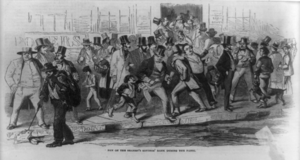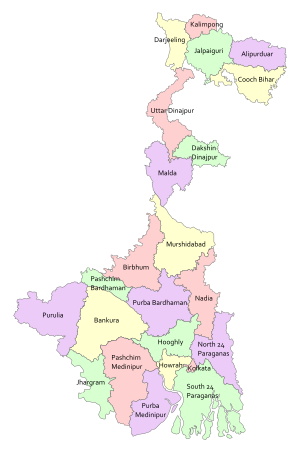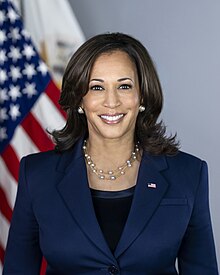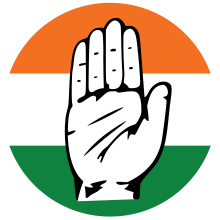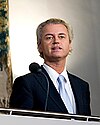Portal:Politics
| Main | Topics and categories | Tasks and projects |
The Politics portal
Politics (from Ancient Greek πολιτικά (politiká) 'affairs of the cities') is the set of activities that are associated with making decisions in groups, or other forms of power relations among individuals, such as the distribution of resources or status. The branch of social science that studies politics and government is referred to as political science.
It may be used positively in the context of a "political solution" which is compromising and non-violent, or descriptively as "the art or science of government", but also often carries a negative connotation. The concept has been defined in various ways, and different approaches have fundamentally differing views on whether it should be used extensively or in a limited way, empirically or normatively, and on whether conflict or co-operation is more essential to it.
A variety of methods are deployed in politics, which include promoting one's own political views among people, negotiation with other political subjects, making laws, and exercising internal and external force, including warfare against adversaries. Politics is exercised on a wide range of social levels, from clans and tribes of traditional societies, through modern local governments, companies and institutions up to sovereign states, to the international level.
In modern nation states, people often form political parties to represent their ideas. Members of a party often agree to take the same position on many issues and agree to support the same changes to law and the same leaders. An election is usually a competition between different parties.
A political system is a framework which defines acceptable political methods within a society. The history of political thought can be traced back to early antiquity, with seminal works such as Plato's Republic, Aristotle's Politics, Confucius's political manuscripts and Chanakya's Arthashastra. (Full article...)
Selected article
The Local Government Commission for England was the body responsible for reviewing the structure of local government in England from 1992 to 2002. It was established under the Local Government Act 1992 replacing the Local Government Boundary Commission for England. The Commission could be ordered by the Secretary of State to undertake 'structural reviews' in specified areas and recommend the creation of unitary authorities in the two-tier shire counties of England. The Commission, chaired by John Banham, conducted a review of all the non-metropolitan counties of England from 1993 to 1994, making various recommendations on their future. After much political debate and several legal challenges, the Commission's proposals resulted in the abolition of Berkshire county council and the counties of Avon, Cleveland, Hereford and Worcester and Humberside. Combined with a second wave of reviews in 1995, under the chairmanship of David Cooksey, the Commission's proposals led to the creation of unitary authorities covering many urban areas of England. It was replaced by the Boundary Committee for England in 2002, which finished this review cycle in 2004.
Featured picture
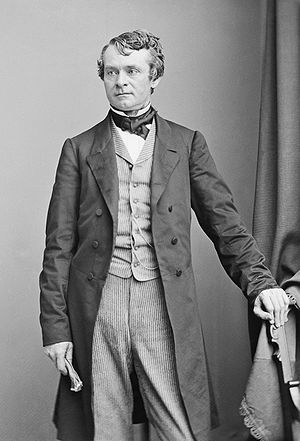
Andrew Gregg Curtin (1817–1894) was a U.S. lawyer and politician. He served as the 15th Governor of Pennsylvania during the American Civil War. During the Civil War, Curtin organized the Pennsylvania reserves into combat units, and oversaw the construction of the first Union military camp for training militia. After the Battle of Gettysburg, Governor Curtin was the principal force behind the establishment of the National Cemetery there. After serving two terms as governor, Curtin was appointed ambassador to Russia by Ulysses S. Grant, and he later served in the House of Representatives from 1881 until 1887.
Selected quote
Selected biography
Ed Stelmach (born 1951) was the Premier of Alberta, Canada, from December 14, 2006 to October 7, 2011. He spent his entire pre-political adult life as a farmer, except for some time spent studying at the University of Alberta. His first foray into politics was a 1986 municipal election, when he was elected to the county council of Lamont County. A year into his term, he was appointed reeve. He continued in this position until his entry into provincial politics. In the 1993 provincial election, Stelmach was elected as the Member of the Legislative Assembly for Vegreville-Viking. A Progressive Conservative, he served in the cabinets of Ralph Klein. When Klein resigned the party's leadership in 2006, Stelmach was among the first to run to replace him. After a third place finish on the first ballot of the leadership race, he won an upset second ballot victory over former provincial treasurer Jim Dinning. Stelmach's premiership has been heavily focused on management of the province's oil reserves, especially those of the Athabasca Oil Sands. Other policy initiatives have included commencing an overhaul of the province's health governance system, a re-introduction of all-party committees to the Legislature, and the conclusion of a major labour agreement with Alberta's teachers.
Did you know (auto-generated) -

- ... that What Hath God Wrought, the 2007 history of Jacksonian America written by Daniel Walker Howe, is dedicated to Andrew Jackson's "political nemesis" John Quincy Adams?
- ... that one abolitionist said that William L. Breckinridge's anti-slavery views would "disqualify [him] from political usefulness"?
- ... that Kim E. Nielsen trained as a historian of women and politics, and came to disability history and studies via her discovery of Helen Keller's political life?
- ... that after being arrested for organizing a general strike in 1920, S. Girinis was sent to the Soviet Union following a Soviet-Lithuanian exchange of political prisoners?
- ... that Nigeria's Muslim–Muslim ticket challenges the norm of religious balance in politics?
- ... that even though the Legislative Assembly of Quebec ordered a monument of Maurice Duplessis in front of its building, later premiers hid it for 16 years to avoid political tensions?
More did you know...
- ...that Thutmose I was the first Pharaoh to be buried in the Valley of the Kings?
- ...that Matt Taibbi's book Griftopia has been described as a "necessary ... corrective" to the assertion that bubbles are an inevitable part of the market economy?
- ...that in the book Net.wars, author Wendy M. Grossman attributes Internet conflict in the 1990s to culture shock from an influx of users?
- ...that former California Assembly Republican Leader and California Republican Party Chair Robert W. Naylor was editor of The Stanford Daily while he was a student at Stanford University?
- ...that co-founder of the Saudi Civil and Political Rights Association Mohammed al-Bejadi spent most of 2011 in prison?
- ...that tiao-kuai is the quasi-federal administration system in China?
In this month
- April 1, 1979 – Iran's government becomes an Islamic Republic by a 98% vote, overthrowing the Shah officially.
- April 9, 1948 – the period known as La Violencia begins with the assassination of Colombian Liberal Party leader Jorge Eliécer Gaitán. For the next ten years Liberals, Communists and Conservatives would fight each other in the conflict.
- April 9, 2003 – Government of Saddam Hussein overthrown by American forces in Iraq.
- April 19, 2006 – Han Myung-sook becomes South Korea's first female Prime Minister.
- April 24, 2005 – Presidential elections in Togo return Faure Gnassingbe to power two months after he was installed by the military following the death of his father, Gnassingbé Eyadéma.
- April 28, 1937 – Saddam Hussein, the President of Iraq was born.
- April 30, 1945 – Adolf Hitler and his wife Eva Braun, commit suicide as the Red Army approached the Führerbunker in Berlin. Karl Dönitz succeeds Hitler as President of Germany; Joseph Goebbels succeeds Hitler as Chancellor of Germany.
News and Current events
- August 11: 4 local government areas in New South Wales, Australia locked down after COVID-19 case
- August 11: Australia: AstraZeneca vaccine access expanded by Victorian government
- August 1: Australia: Victorian lockdown lifted
- July 29: Tunisia's president dismisses prime minister, suspends parliament
- July 25: Australia: Wikinews interviews Reg Kidd, mayor of the City of Orange, about COVID-19 lockdown and local government
- July 23: South Australia enters week-long lockdown to contain COVID-19 Delta variant spread
- July 21: Technological University Dublin senior lecturer Dr Lorcan Sirr speaks to Wikinews on housing market in Ireland
- July 21: Three rural councils in New South Wales, Australia enter 7-day lockdown
- July 21: Australia: Victoria lockdown extended by a week with 85 active cases recorded
- July 15: California governor signs new state budget, eligible Californians to get stimulus payments
Topics and categories
General images
Related portals
Associated Wikimedia
The following Wikimedia Foundation sister projects provide more on this subject:
-
Commons
Free media repository -
Wikibooks
Free textbooks and manuals -
Wikidata
Free knowledge base -
Wikinews
Free-content news -
Wikiquote
Collection of quotations -
Wikisource
Free-content library -
Wikiversity
Free learning tools -
Wiktionary
Dictionary and thesaurus



